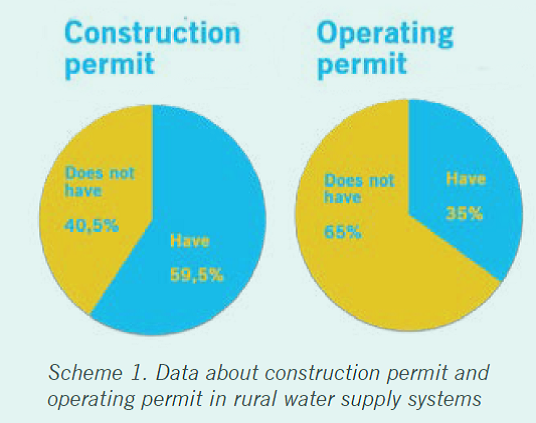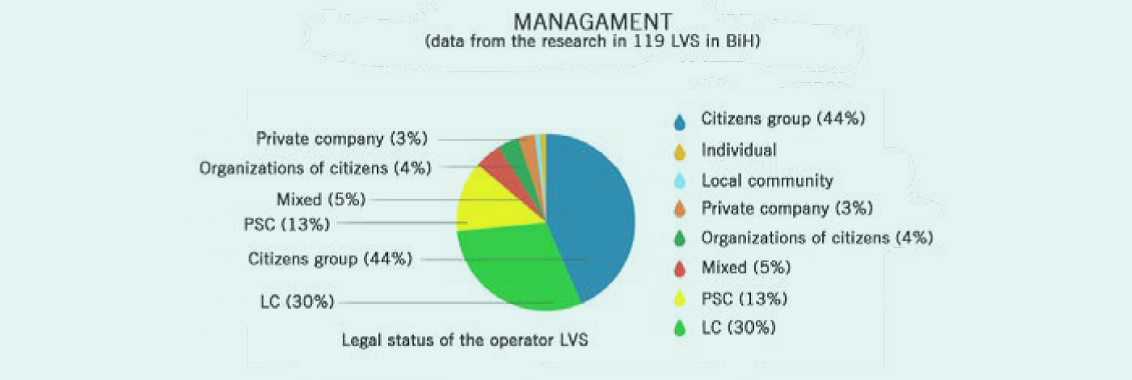Author: Snežana Mišić Mihajlović
A considerable part of the BiH population uses drinking water from the small rural water supply systems, which most often do not have adequate systems for operational management and quality control of the delivered water.
Right to water encompasses availability of water in accordance with drinking water standards, affordable water services, equal access for all citizens, as well as organization of the water supply service in the way acceptable for a particular culture. In Bosnia and Herzegovina (BiH), considerations over quality of water supply services usually intensify only when problems arise, either caused by the water shortage or occurrence of water-borne diseases. Discussions then focus on the work of public water utilities and quality of water supply services in urban areas, while problems faced by rural population get neglected.
According to the survey from 2016[1], more than one third of BiH citizens is not connected to the public water supply systems: 28% of citizens use water from the rural water supply systems, 6% of citizens rely on individual water sources (usually wells), while the remaining 66% of citizens use drinking water from the public water supply systems (Table 1).
 Table 1. Data about population coverage with water supply services in BiH
Table 1. Data about population coverage with water supply services in BiH
Thus, a considerable part of the BiH population uses drinking water from the small rural water supply systems, which most often do not have adequate systems for operational management and quality control of the delivered water. About 30% of local self-governance units state that they do not have any data about rural water supply systems. None of the public institutions has a formal competence to collect data on rural water supply and no institution collects such data. However, significant financial means are being invested in construction of the rural water systems. For example, in 2015, the total amount of funds invested in rural water supply and sanitation in the 20 analysed cities/ municipalities was 3.4 million BAM.
Two thirds of the rural water systems function in informal ways, without the required documentation and permits (Scheme 1), which is an obstacle for resolving legal issues and adequate financial management. In 40% of the rural water systems, the operators manage the systems without contractual relationship with the systems’ owners, which means that they do not have a set of defined obligations to adhere to (e.g. obligations related to reporting, water quality testing, operational planning or transparency of tariff-setting).

Scheme 1. Data about construction permit and operating permit in rural water supply systems
Besides the fact that the legal competence for water supply service is with the local self-governance units, in 84% of cases, the construction of water systems in villages was initiated by citizen groups or local community structures. Users and operators of rural water systems and even the local administrative employees are not sufficiently acquainted with the valid regulations for ownership and management of the water systems, or they interpret the regulations in different ways. Representatives of 16 out of 20 analysed local administrations stressed that the biggest obstacles for improved rural water supply are either unclear legal framework or unsolved legal issues in rural water systems.
The role of an operator in rural water systems is commonly performed by the following structures (Scheme 2):
- Local communities and citizen groups manage 78% of rural water systems. The biggest problem with this type of operator is the non-transparent reporting and irregular water quality testing.
- Public water utilities manage 13% of rural water systems. These utilities have a solid capacity for service provision in the domain of planning and water quality control, but their response-time in case of the systems’ failures is longest out of all analysed operators.
- Private companies manage relatively small number of systems (3%). The companies report regularly, are quick at fixing breakages and they regularly test water, but they set high price for water connection and water tariff.
 Scheme 2. Data about legal status of rural water systems’ operators
Scheme 2. Data about legal status of rural water systems’ operators
Recommendations for Improvement
For more intensive development and improvement of the water supply service in rural areas, it is necessary to create a more conducive legal framework at all levels of authority in BiH.
In the Laws on Water in both B&H Entities and cantons in the Federation of B&H, the principles from the EU Directives – cost recovery, user pays and polluter pays should be elaborated in more details in order to create the legal basis for water tariff setting.
Laws on Communal Affairs at entity level in the Republika Srpska, in Brčko District and at cantonal level in the Federation of BiH should be harmonized with the Laws on Water. Water supply modalities should be elaborated in more detail, particularly the articles that define who can be the owner and operator of the water system. Laws on Communal Affairs should also define the obligatory content of the municipal/ city decision about operation of rural water supply systems.
Relevant ministries and agencies at entity and cantonal level should:
- Establish the function of advisory and technical support to local administrations and operators of the water systems;
- Set the proportion of funds (e.g. from the water fee fund) that should be allocated for water supply projects prioritized in strategic documents;
- Appoint bodies that will define and monitor a set of standard indicators about rural water systems operation;
- Establish systems for regular communication among institutions so to ensure joint learning about effective approaches to improvement of the rural water supply;
- Organize advisory and training sessions for representatives of institutions at all levels for interpretation of relevant laws.
Local self-governance units should appoint persons and administrative units with the following competencies:
- Regular maintenance of the database on water supply systems;
- Realistic planning of funds from the local budget or other sources, that are needed for implementation of water supply projects, in accordance with priorities defined in local strategies;
- Organize training and expert support for operators of the rural water systems with aim to interpret legislation and resolve any problem;
- Organize education about water systems management for citizens concerned;
- Inform citizens about possible ways for their participation in decision-making, preparation of strategies and operational plans, so that they can put forward their priority projects.
Owners of rural water systems should decide about the best way for management and maintenance of the systems. If local communities, citizen associations or groups, in the position of the owner, decide to delegate these jobs to a legal person, they should opt for the operator that has sufficient capacities to deliver communal services. Owners and operators should conclude contracts for service provision that will thoroughly define the standards and conditions for the service (e.g. rules for new connections, tariff setting methodology, etc.).
[1] Survey conduceed in the project „Right to safe and affordable drinking water for all“ financed by EU


